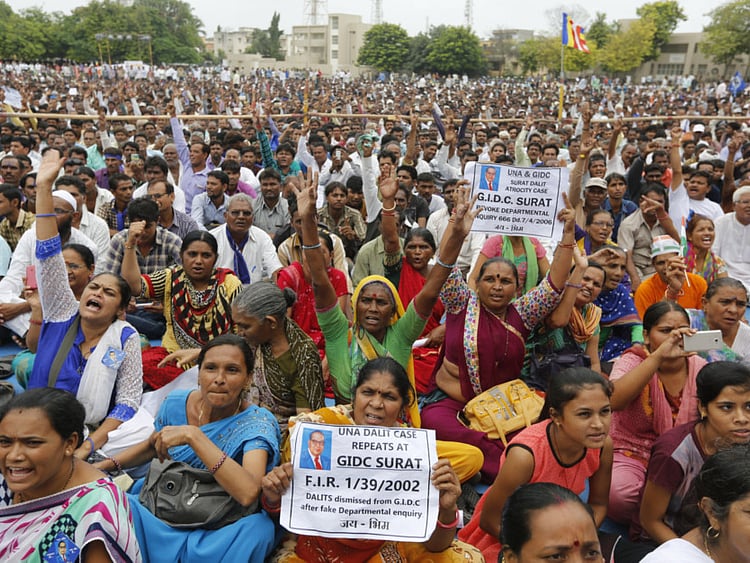On August 15, 2016, people in India were celebrating the 69th anniversary of their independence. There was the usual huge Independence Day parade in capital New Delhi. But the celebrations brought out both pride and anguish. All Indians imbibed the “freedom struggle” stories as children. They were taught to be proud of their country’s prolonged battle against colonialism, of the martyrs who gave their blood for the country. India showed the world how to shed the shackles of imperialism. It spread the doctrine of non-violence at a time when it seemed an impossible dream. Isn’t that to be proud of? But for those of us who work with the country’s poorest, most marginalised groups, to ask some loaded questions is almost mandatory.
What does freedom mean? Free to be mercilessly thrashed for doing a job thrust forcibly on you, such as skinning dead cows. And is it your destiny because that’s the caste you were born into? “It’s our curse,” dalits (India’s most oppressed group, our “untouchables”) have told me. As I wrote this, the dalits were doing a special “freedom” march to Una, a small town in Gujarat, where, last month, four young men were brutally beaten up with iron rods by a mob of cow vigilantes for skinning dead cows. These young men were from the “chamar” or leather-tanning caste. Even now, if ordered to move a carcass — and that means any dead animal, ranging from cows to goats to dogs or cats — they are compelled by societal norms to do so, regardless of whether they’ve earned a doctorate in Economics or History.
The unwritten rule: Once a chamar, always a chamar. Yes, India has come a long way economically, but its feudal system is alive and well. And not just kicking. It’s maiming, raping and killing, too!
As millions of Indians celebrated Independence Day, the Times of India ran a story about Ovindra Pal, a dalit man who, despite having a Master’s in History, was forced to work in his father’s trade, skinning bovine carcasses. Understandably, Pal is bitter, as are thousands of dalits who have painstakingly inched up the education ladder, but still can’t find a job commensurate with their skills and qualifications.
India needs to stop the prevailing culture of murderers and rapists getting away with crimes against its poorest people. All Indians — whether Christian, Muslim, Parsi, Buddhist, Jain or Hindu — carry some vestiges of the caste system in them. Caste and casteism have been carried to every corner of the globe to which the Indian diaspora has migrated. India’s caste prejudices manifest themselves most clearly in the matrimonial columns in newspapers, where prospective brides and grooms of all religions are sought for traditional marriage alliances. Caste and skin colour are the most important criteria for admitting a strange woman into that most intimate circle — the home and the family. The woman who will bring forth children to perpetuate the line must almost always be fair-skinned and of the same caste. Exceptions to this rule are very rare.
Making a mockery of everything
My plea is very basic and echoes that of the marchers in Gujarat for justice and equality. I don’t care if people continue to choose whom they eat with or to whom they marry their daughters and sons. Change, after all, comes slowly. But India does need to stop the prevailing culture of total impunity that allows murderers and rapists of the nation’s poorest people to flaunt their crimes, knowing they can get away with anything. In India, justice for the poor and powerless is the exception rather than the rule. Its much-maligned media cries itself hoarse, but the powerful continue to strut around their crime scenes, protected by politicians and corrupt bureaucrats.
For how many centuries more will the country continue to allow heinous caste crimes to go unpunished? It makes a mockery of everything that India’s freedom fighters had died for. Must dalits fight alone? Can’t decent Indians stand with them? India’s more enlightened business leaders, socially-conscious Bollywood actors and its few decent politicians should organise a different freedom celebration. India can and must begin a campaign against casteism. Only when the medieval practice of untouchability and caste is honestly a thing of the past, will the country be able to truly celebrate its freedom.
— Guardian News & Media Ltd
Mari Marcel Thekaekara is a human rights activist and writer based in Gudalur, Tamil Nadu. She is president of the Nilgiris chapter All India Womens’ Conference. In 1985, she co-founded Accord to work with adivasi (tribal) people.
Sign up for the Daily Briefing
Get the latest news and updates straight to your inbox
Network Links
GN StoreDownload our app
© Al Nisr Publishing LLC 2026. All rights reserved.
